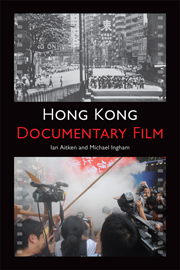Book contents
- Frontmatter
- Contents
- Introduction
- 1 Hong Kong, Britain, China: The Documentary Film, 1896–1941, A Page of History (1941) and The Battle of Shanghai (1937)
- 2 Hong Kong, Britain, China: The Documentary Film, 1947–69, the ‘Picturesque’ Committed Film and Water Comes over the Hills from the East (1965)
- 3 Colonial Film: The Development of Official Film–making in Hong Kong, 1945–73, the Hong Kong Film Unit (1959–73) and This is Hong Kong (1961)
- 4 Public-service Broadcasting in an Authoritarian Setting: The Case of Radio Television Hong Kong and the Development of Television Documentary Film in Hong Kong
- 5 The Documentary Films of Radio Television Hong Kong (RTHK) and The Hong Kong Case (1989)
- 6 Aesthetics and Radicalism: An Overview of Independent Documentary Film in Hong Kong, 1973–2013
- 7 A Critical Analysis of Significant Independent Documentary Films of the Past Three Decades
- Conclusions: The Future of Independent Documentary Film in Hong Kong, China and the Region
- Bibliography
- Index
6 - Aesthetics and Radicalism: An Overview of Independent Documentary Film in Hong Kong, 1973–2013
Published online by Cambridge University Press: 05 September 2014
- Frontmatter
- Contents
- Introduction
- 1 Hong Kong, Britain, China: The Documentary Film, 1896–1941, A Page of History (1941) and The Battle of Shanghai (1937)
- 2 Hong Kong, Britain, China: The Documentary Film, 1947–69, the ‘Picturesque’ Committed Film and Water Comes over the Hills from the East (1965)
- 3 Colonial Film: The Development of Official Film–making in Hong Kong, 1945–73, the Hong Kong Film Unit (1959–73) and This is Hong Kong (1961)
- 4 Public-service Broadcasting in an Authoritarian Setting: The Case of Radio Television Hong Kong and the Development of Television Documentary Film in Hong Kong
- 5 The Documentary Films of Radio Television Hong Kong (RTHK) and The Hong Kong Case (1989)
- 6 Aesthetics and Radicalism: An Overview of Independent Documentary Film in Hong Kong, 1973–2013
- 7 A Critical Analysis of Significant Independent Documentary Films of the Past Three Decades
- Conclusions: The Future of Independent Documentary Film in Hong Kong, China and the Region
- Bibliography
- Index
Summary
SCOPE AND BACKGROUND
This chapter provides a general overview of the independent documentary films produced in Hong Kong from the early 1970s up to and including the early years of the second decade of the new millennium. It is intended both as a background to and a comprehensive perspective of the field of independent, non-broadcast documentary practice in the contemporary era, enabling the reader to form a clear picture of the various strands of development over a vibrant and often turbulent forty-year period in the city's history; this includes, of course, the 1997 transfer of sovereignty to China and the relatively short but fertile period of post-colonial non-fiction film creativity.
By sharp contrast with the government-sponsored and television company-driven initiatives of previous decades, the independent sector that emerged in the late twentieth and early twenty-first centuries, while being very much preoccupied with Hong Kong's present and future state and status, was somewhat reminiscent of the early Hong Kong independent film work of Lai Man-wai in its relative freedom from institutional control. This factor has been of crucial importance in the emergence of a small but expanding and lively documentary film practice in the city, which, to judge by the work of both established practitioners and newer voices, has impinged on the critical attentions of both local and global audiences and commentators. The overview offered in the present chapter will provide a platform for exploring a number of specific and significant films by major contemporary practitioners in the final chapter.
- Type
- Chapter
- Information
- Hong Kong Documentary Film , pp. 172 - 196Publisher: Edinburgh University PressPrint publication year: 2014

